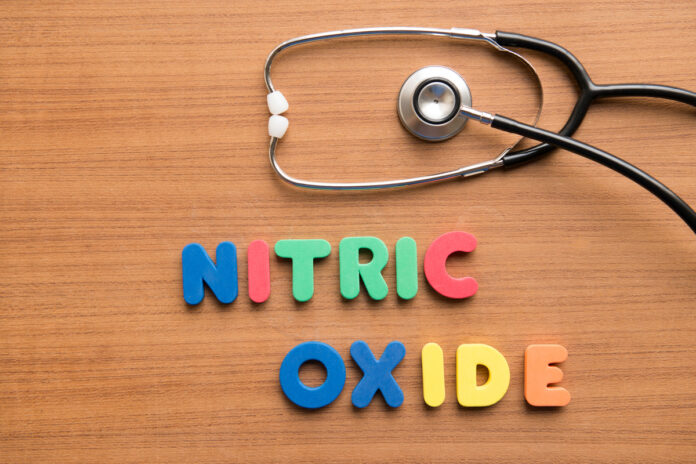Having balanced nitric oxide levels is incredibly important for maintaining your overall health. When nitric oxide levels become unbalanced, they can cause a series of negative things to occur in our bodies, including high blood pressure, heart disease, and a weakened immune system. Therefore, learning how to keep your nitric oxide levels balanced is key to keeping your body functioning at optimal levels.
With that said, today, we’re going to talk all about nitric oxide. We’re going to cover what nitric oxide is, the benefits of balancing it, and a few ways to balance your nitric oxide levels naturally. Let’s get started.
Test your Nitric Oxide levels online free
If you would like to test your nitric oxide levels for free, visit NitricOxideTest.com for a simple 15-second at-home test.
What is Nitric Oxide?
Starting off, we first wanted to go over a quick summary of what nitric oxide is. With that said, nitric oxide (also known as NO) can best be described as a compound naturally found in the body that plays a crucial role in maintaining many bodily functions. Most commonly, it is known for its ability to maintain the health of blood vessels and deliver oxygen, nutrients, and blood evenly throughout your body. With that said, a few of its other key functions include:
- Increasing blood flow and oxygen to the brain
- Relaxing smooth muscles
- Promoting healing to wounds
- Improving cognitive function
- Improving nervous system function
And more. As you can see, nitric oxide helps maintain many different functions in the nervous system to keep things running smoothly and is essential for keeping our health in tip-top shape.
What are the Benefits of Balanced Nitric Oxide Levels?
As mentioned above, keeping your nitric oxide levels balanced is the key to keeping your body thriving. In fact, maintaining balanced nitric oxide levels may even be able to help you fight heart disease, illness, and low energy levels. With that said, here is a list of some of the key benefits of keeping your nitric oxide levels balanced.
1. Stronger Immune System
The first benefit of keeping your nitric oxide levels balanced is that it helps to maintain a stronger immune system. From helping your cells fight foreign invaders to maintaining the auto-immune process, nitric oxide is key to keeping these functions balanced and can help improve the immune system’s strength over time.
2. Improved Heart Health
Next, another key benefit of having balanced nitric oxide levels is that it can help to improve heart health by regulating your blood pressure. This is because nitric oxide naturally helps blood vessels relax, therefore improving circulation throughout the body. As a result, this may help to prevent blood clots, clogged arteries, and artery disease (sciencedaily.com).
3. Better Muscle Performance
Next, another key benefit of having balanced NO levels is that it may be able to help improve muscle performance. This is because nitric oxide naturally helps to regulate the distribution of oxygen to the muscles while also increasing blood flow. This contributes to lower blood pressure and helps the muscles in the body to move, contract, and expand easier (trainright.com). Therefore, having balanced and regulated nitric oxide levels can be extremely beneficial to athletes or those who love to get their bodies moving.
4. Increased Energy Levels
To go along with better muscle performance, having balanced nitric oxide levels is also believed to contribute to increased energy levels in the body. This is once again due to increased oxygen and blood circulation, which can help to deliver essential nutrients to all parts of the body to keep them active and thriving. Therefore, this can help to keep the body more alert and energetic throughout the day and could be particularly useful for older people.
5. Lung Health
Lastly, another key benefit of having balanced nitric oxide levels is that it can help to keep your lung health in check. This is thanks to the natural circulation of nitric oxide in the body that can help to deliver essential nutrients to the lungs. As a result, this may be able to help people heal more quickly from illnesses that attack the lungs and may be useful in fighting asthma and pneumonia.
What happens when Nitric Oxide Levels are Unbalanced?
Now that we’ve covered what nitric oxide is and the benefits of keeping your levels balanced, you may be wondering what happens when nitric oxide levels become low or unbalanced. Well, since nitric oxide plays such a crucial role in the circulation of nutrients and protecting the immune system, when it’s unbalanced, it can cause a variety of problems that can greatly compromise your health.
With that said, a few health issues that can arise due to low or unbalanced nitric oxide levels include:
- Endothelium dysfunction
- High blood pressure
- Heart disease
- Atherosclerosis
- Issues with memory
- Low energy
- Erectile dysfunction
And more. Today, nitric oxide deficiency is actually quite common in society, especially as we age, as our bodies naturally begin to produce less and less nitric oxide the older we get. Therefore, we have to be extremely careful when monitoring our NO levels to ensure they do not fall below the required level.
You can read more about symptoms of low and unbalanced nitric oxide levels here on nutrigardens.com.
How can you Balance Nitric Oxide Levels?
Now that we’ve covered what nitric oxide is and the benefits of having your nitric oxide levels balanced, we also wanted to cover a brief overview of how you can balance your nitric oxide levels in your daily life. From diet to supplements, here are a few of the most common ways to maintain your NO levels.

DIET
To start, as with many things, changing your diet can often help to fix certain imbalances in the body, and that’s no different with nitric oxide. This is because nitrate is a compound that is also naturally found in many foods that you can easily begin to incorporate more of in your diet, which may be able to help correct imbalances over time. With that said, here are some foods you may want to consider adding to your diet to help boost your NO levels.
1. Vegetables
To start, vegetables are said to be one of the best things to consume when it comes to boosting your nitric oxide levels due to the fact that they are naturally high in nitrates. For this, you’ll want to aim for root vegetables and leafy greens, such as spinach, arugula, lettuce, kale, cabbage, swiss chard, garlic, and spirulina, as these are believed to contain the highest level of nitrates. However, just consuming more vegetables, in general, may help to boost your NO levels and can help to improve your overall health, to begin with.
2. Fruits
Aside from vegetables, citrus fruits are another great option to consume for NO as they are naturally high in essential minerals that can naturally boost your NO levels over time. For this, you’ll want to look for fruits high in Vitamin C, such as lemons, limes, oranges, and grapefruit, as Vitamin C contains essential nutrients that can help to replenish NO levels.
However, aside from citrus fruit, pomegranates and watermelon are also excellent options for boosting NO levels. This is because pomegranates are rich in antioxidants that may be able to help preserve nitric oxide, while watermelon is said to contain L-citrulline, which is often used by the body when producing nitric oxide. Therefore, consuming more fruit, in general, may be a good way to boost your NO levels and help increase your general health.
3. Nuts and Seeds
Next, another great source of NO from foods comes from nuts and seeds. This is because nuts and seeds are extremely high in arginine, which is known to assist in the production of nitric oxide. Therefore, nuts and seeds, such as walnuts, flax seeds, and almonds, are a great option to consume to balance your nitric oxide levels and help get your health back to normal.
4. Meat, Poultry, and Fish
Next, meat, poultry, and fish are also said to be excellent sources of NO, as they contain a compound known as CoQ10. As a result, this compound is believed to naturally preserve nitric oxide, as well as help to maintain heart health, and may be a food you want to consider adding to your diet because of this.
5. Dark Chocolate
And lastly, for chocolate lovers, dark chocolate is another excellent food to consume for NO. This is because dark chocolate is rich in flavanols, which, when found in cocoa, are said to be particularly good for the body, as it can help to increase and level out NO levels.
Overall, making a few simple changes in your diet may be able to help balance out your nitric oxide levels naturally over time. However, as with any food, these foods should never be used in place of medicine or taken over the expert advice provided by a doctor or medical expert. For that reason, make sure you always consult your doctor for any and all nutritional needs before making any other dietary changes.
You can read more dark chocolate and other dietary options for increasing nitric oxide levels here on aiwellness.com.

EXCERCISE
Next, daily exercise is another great way to keep your nitric oxide levels balanced. This is because exercise naturally helps get your blood pumping, which can help with endothelial function, which naturally produces nitric oxide. As a result, when there is a lack of exercise, there can also be a lack of production for the endothelial function, which could contribute to heart disease and or high blood pressure (ncbi.gov).
Thus, by exercising, your body is able to maintain healthy blood vessels, which can help your body to better produce nitric oxide naturally. Therefore, exercises such as aerobics, walking, cardio, and resistance training are recommended for this. However, always be sure to talk to your doctor before trying any new exercises to ensure that it is right for you and your personal health.

ANTIOXIDANTS
Next, another way to naturally boost nitric oxide levels in the body is to make sure you are getting enough antioxidants in your diet. Nitric oxide is one of the molecules in the body that needs to be replenished constantly in order to maintain, and taking regular doses of certain antioxidants can help to do that. With that said, here is a list of some key antioxidants you may want to include in your diet to help your NO levels.
1. Vitamin E
The first antioxidant you may want to try is Vitamin E. Known for supporting immune function, Vitamin E helps to protect the body from free radicals, which often contribute to disease. However, regarding nitric oxide, a study showed that over the course of several weeks, the administration of both Vitamin E and selenium together helped increase the production of nitric oxide in the body (nature.com). Therefore, Vitamin E may be a good choice to consider when looking to boost your NO levels.
2. Vitamin C
Secondly, Vitamin C is another strong antioxidant known for its ability to fight free radicals and help grow and repair bodily tissue. In regards to nitric oxide, a study by PubMed showed that over the course of several months of regular consumption, Vitamin C helped to increase nitric oxide synthase activity in the body and, therefore, may be good to use for boosting your NO levels (pubmed.gov).
Of course, it is important to note that, as with any vitamin or supplement, these should never be used in place of medicine or taken over the expert advice provided by a doctor or medical expert. For that reason, make sure you always consult your doctor for any and all nutritional needs before making any other dietary changes.

SUPPLEMENTS
And lastly, another way to help balance out your nitric oxide levels is to try taking supplements. For this, there are typically three supplements that are commonly recommended to help with NO levels and that is L-arginine, L-citrulline, and beetroot. Let’s take a quick look at each of them.
1. L-arginine
The first supplement is L-arginine. Known to be an amino acid often found in poultry, fish, dairy, and meat, L-arginine helps with circulation as well as assists with the process of making proteins. In regards to nitric oxide, when consumed, L-arginine is converted into nitric oxide in the body, which may make L-arginine a useful supplement to take if you have low nitric oxide levels (WebMD).
2. L-Citrulline
Aside from L-arginine, another supplement commonly taken to boost nitric oxide levels is L-citrulline. Commonly found in nuts, legumes, and meat, L-citrulline, like L-arginine, is an amino acid that can boost nitric oxide in the body, helping to improve blood flow and improve your artery function (WebMD).
3. Beetroot Extract
And lastly, another key supplement often used to help balance out nitric oxide levels is beetroot extract. Known for its ability to enhance blood flow and improve your digestion, beetroot is naturally rich in nitrates, which, when consumed, is converted into nitric oxide. Therefore, beetroot can be another great supplement to take to help boost your nitric oxide levels.
However, as mentioned above, you should never take supplements without consulting your doctor first, as everyone’s dietary needs are different. Therefore, do not take any supplements or make any dietary changes before thoroughly discussing them and their risks with your doctor.
Conclusion
In conclusion, nitric oxide is an essential molecule found in the body that, when balanced, helps to promote better health. From increasing circulation to strengthening the immune system, keeping your nitric oxide levels balanced is key to maintaining optimal health and should be taken very seriously. Above all else, we hope this article has helped you to better understand what nitric oxide is, the benefits of having your levels balanced, and how you can improve your NO levels in your daily life to keep your body happy, healthy, and problem-free for many years to come.
Sources
https://www.webmd.com/diet/healthy-foods-nitric-oxide#1
https://www.medicalnewstoday.com/articles/292292
https://www.healthline.com/nutrition/how-to-increase-nitric-oxide#:~:text=Nitric%20oxide%20is%20a%20molecule,to%20widen%20and%20increase%20circulation.
https://nutrigardens.com/blogs/blog/5-nitric-oxide-deficiency-symptoms-to-look-for
https://www.medicalnewstoday.com/articles/326381#other-reported-benefits
https://www.webmd.com/diet/healthy-foods-nitric-oxide#1
https://pubmed.ncbi.nlm.nih.gov/12522125/


